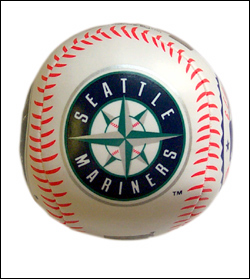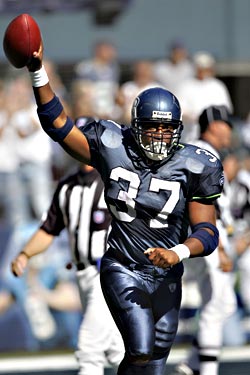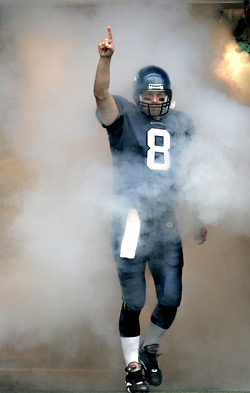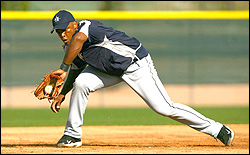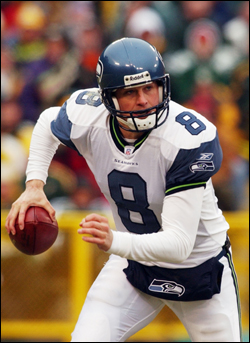Baseball, of course, is that most quantifiable of pastimes. By pouring enough numbers and equations into a computer, one can be deluded into thinking that winners can be picked. One also can learn that the little wager you left in Nevada this time last year is still busting the guts of bookmakers who can’t believe you really thought the New York Yankees would win the 2003 World Series when every discerning Sabermetrician could easily see that it would be the, uh, Florida Marlins.
The unavoidable truth is that the zillion-to-one Marlins are world champs as this season dawns. The kajillion-to-one Anaheim Angels were winners the previous year. Does this mean the Detroit Tigers and Pittsburgh Pirates will face off next October? Maybe, but probably not. What it really means is that past performance may not or does not reliably predict the future in baseball. Teams fail or prevail because of day-to-day human flourishes and foibles. The Yankees boast the flourishing Alex Rodriguez at third base this year, but only because Aaron Boone could not play due to the foible of an off-season injury. With baseball, then, despite what is said and predicted, no one knows what will happen or when. Perhaps this is why the five latter-day Nostradamuses of The Seattle Times sports staff supposed in the March 30, 2003, season-preview special section that Florida would finish (amid its five-team division) no higher than second, with two picking them fourth and two saying fifth. (I guessed sixth.)
It is a guess. How could it not be? The future, by its nature, is unknowable, hence the silliness, for example, of the perennial job-interview question: What do you expect to be doing five years from now? (Working in New York at the World Trade Center? Playing for the Florida Marlins?) During the early cycles of the Washington State Lottery, some sold and others actually bought prediction sheets. Neither seemed to wonder how a yet-to-be-determined, randomly drawn numerical sequence could be known. Rabid Sabermetricians would counter that player performances are well known and quantifiable, thus easily projected. Fine. My response: the 2003 Florida Marlins.
Predicting, of course, can be amusing when it isn’t being held to the grim suspicions of baseball’s stat rats, who question seemingly every roster move because it never jibes with what the computer says to do. I vaguely recall (or am imagining) a dorm-room session circa 1967 when some of us were predicting (based, of course, on rigid performance analysis) that, within two decades, Sonny Bono would be a member of U.S. Congress, Cher would have won an Oscar for Best Actress, and Ronald Reagan would be president. (Actually, the above isn’t quite true, as nobody believed the Reagan thing would happen.)
Believing in a knowable basis for baseball predictions—peering off through the months-thick nebula of projected slugging percentages and pitching matchups and into the distant October, where the prize orb, the World Series winner, can be foreseen—is an odd astronomy. One wonders if the 162 regular-season games could maybe be dispensed with. For those who’d just as soon fast-forward past the obligatory regular season but would rather not bother with the statistical analysis, here’s my guaranteed way to divine this year’s World Series winner: Convene 29 acquaintances. Have each select a different major-league team. I absolutely guarantee that one of you will be correct this year, maybe even the one who “picks” Florida.
